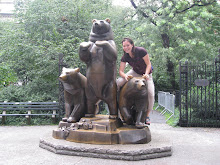"the fig-leaf of “scientific observation” can no longer cover the phallus of ethnographic desire"
Perhaps my favorite quotation from the entire piece. "Post-Human Anthropology" is a paper by Neil Whitehead explaining the reasoning behind his decision to do participant-observation/observing-participant ethnographic research on how sex and violence are approached in cyberspace. He recognizes that, like Hine in her article, the old/traditional methods of doing ethnographic research no longer work. The traditional subjects have disappeared; how does one approach a culture that is "both geographically unlocated and by definition uncannily disembedded or distinct from localized cultures?"
Whitehead decided to form a band, Blood Jewel, with the express purpose of generating aural/visual content to post on the internet and elicit responses to the work - essentially becoming his own subject in an 'autoethnography' focusing on violence/sex as represented in the fairly anonymous realm of cyberspace. Whitehead had noted that "in the realm of cyberspace it is only through active participation that there is anything to observe at all. In short, in order to understand
desire we must become desiring subjects ourselves."
Whitehead had done research on sexuality and violence in the cultures of French Guiana and Brazil, recognizing the dearth of research on these topics as well as their evolving role in "western" and cyber society. "Western sexuality itself has necessarily become more disembodied and immaterial in a sexually toxic and physically dangerous social world. The explosion of on-line sex sites, ranging from commercialized pornography and camera chat rooms to person-to-person dating and “swinger” sites, all represent a new realm of sexual experience and subjective engagement. Highly visual, masturbatory, and anonymous the possibilities for safe-sex make such cyber-sexuality, or “outercourse,” a credible alternative to dangerous intercourse with “real” people. Nor is this just a framework for desire; it is also enacted on a massive scale, suggesting myriad ways in which sexual experience has become radically detached from the physical...
cyber-life and its digital subjectivities seems to stimulate and offer opportunities for the expression of both sexual and violent desires. As Freud notes, the “uncanny” occurs where the accepted structure of a world is violated, “when the boundary between fantasy and reality is blurred” (Freud 2003: 150), and so to challenge the “accepted structure of the world,” which clearly has no adequate narrative for either contemporary violence or the sexual, the realm of cyberspace becomes a particularly fruitful context in which to blur such boundaries and perhaps stimulate better intellectual understanding."
This is particularly intriguing for our research on anonymity because Anonymous and anonymous persons on the internet do tend to gravitate towards hyper-sexual and hyper-violent content. The posts and identities presented seem to be more steeped in a language and culture reflecting a more violent sexuality than is the norm in "real" life. Cyber life has allowed for "safe" sex and expression - Whitehead notes that his Blood Jewel site has more female fans than male, hypothesizing that the freedom from physical bounds allows women to be more expressive and free with both sexual and violent ideas without fear of rape or other retribution. Which is intriguing because the prototypical image of an "anonymous" user or member of Anonymous is that of a hetero, white male. A friend pointed out that our supposedly neutral, unmarked or anonymous cyberspace is in fact heavily, wearyingly normed as white (male, straight) able-bodied and middle class; what does that mean for people who aren't those things?(online I can be whoever I want to be, so long as I'm just like you).
In regards to our research on anonymity on the internet, this article is a good starting point to look at perhaps why the anonymous posts tend toward violence and sexually suggestive/explicit content. It also poses some interesting questions in terms of our research ethics. As Whitehead remarked, "ethnographically my actions are
ethically acceptable because they are based on that authentic artistic goal. Nor are such transgressive artistic acts undertaken as a means of experimenting with others lives, because it is my own experience of this project that is the auto-ethnographic subject of study. If I were to attempt to research individual users as “informants” on the processes and dynamics of MySpace, then the relation between on-line identity
and off-line social identity would be all important and lead directly to the ethically fraught issues of how much masking of identity and purpose could be legitimate for the ethnographer."
So, how should we move forward with researching people who are only united by their anonymity? Can we become "anonymous" ourselves and elicit information, ethically, for our own work? Where do we draw the line.
Just some thoughts to leave this post with:
- "the concept of identity has become highly problematic in anthropology, for in asking the question “who is what?”, if we have not been greeted with a recalcitrant silence,25 then we have received the reply that “we are not who you think we are!”" Whitehead
- The pornography industry generates $12 billion dollars in annual revenue—larger than the combined annual revenues of ABC, NBC, and CBS. Of that, the Internet pornography industry generates $2.5 billion dollars in annual revenue.
- "power-relations of technological competence and ownership become a form of neo-colonial dominance embedded in the social and cultural life of the post-colony."
- "violence is always more than its material appearance, that part of the instrumentality of violence could be its endemic and persistent affects on imagination and subjectivity"
- "Making sense of other people is never easy, and making sense of how other people make sense can be very difficult indeed." Keith Basso (1979)
Subscribe to:
Post Comments (Atom)

No comments:
Post a Comment